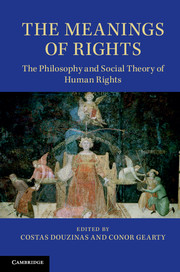Introduction
Published online by Cambridge University Press: 05 June 2014
Summary
Human rights are an inescapable fact in the world. They bring together the North and the South, the left and right, church and state. Street activists look to them while armed forces adopt codes of conduct ostensibly on their basis. They are the ideology after ‘the end of ideologies’, the only set of values left now that we have arrived at ‘the end of history’. Of course, such pervasiveness comes at a price of intellectual promiscuity. Human rights are used as a symbol or synonym for liberalism, capitalism or individualism by some and for development, social justice and/or peace by others. In the South, rights are seen as primarily collective rather than individual, social and economic rather than civil, associated with equality rather than with liberty. In the North, they can reflect commitments to solidarity and social justice as well as to political freedom – but they have also been used to underpin invasion and military brutality.
This volume captures and reflects the variegated nature of the meaning of human rights in contemporary scholarship and in public discussion. It brings together an eclectic group of leading philosophers, lawyers and social theorists to examine the foundations, meaning and impact of human rights on the world, and the dynamic inherent in the phrase’s use today. The term itself is a combined one: the ‘human’ refers to morality and ethics and to the treatment that individuals are entitled to expect from public and private powers ‘Rights’ refers to their legal provenance. The hybridity of human rights introduces a number of paradoxes at the heart of society, which this volume explores in a way that is inquisitive, critical and above all inter-disciplinary. Let us introduce the volume by looking at four in particular.
- Type
- Chapter
- Information
- The Meanings of RightsThe Philosophy and Social Theory of Human Rights, pp. 1 - 12Publisher: Cambridge University PressPrint publication year: 2014



